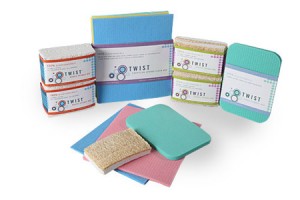The ethics of sponges
 One of the inevitable side-effects of the apparent interest in eco-friendly products is the emergence of greener, or less harmful, or whatever, alternatives for even mundane items that you probably don’t think about too much. Or at least, I don’t remember ever thinking about sponges too much — let alonethinking about whether or not my sponge decisions were good or bad for the environment.
One of the inevitable side-effects of the apparent interest in eco-friendly products is the emergence of greener, or less harmful, or whatever, alternatives for even mundane items that you probably don’t think about too much. Or at least, I don’t remember ever thinking about sponges too much — let alonethinking about whether or not my sponge decisions were good or bad for the environment.
And yet, here (via Coudal) is Twist, which informs us:
Making a sponge is a very challenging process, and one that only a handful of producers undertake. … This process can lead to a lot of waste. Billions of sponges are produced every year. An industry that big has an impact on the world around it.
Thus Twist’s Naked Sponge #55 boasts “no dyes and 100% cellulose.” Its Euro Sponge #10 is “durable, biodegradable, and (dare we say it) stylish.”
Perhaps I’ll look into this more later, but in the short term, I will start feeling guilty about my reckless sponge consumption, right away.




 "
"












 Kim Fellner's book
Kim Fellner's book  A
A
Reader Comments
I tried these Twist sponges when I saw them at Whole Foods a while back, because I’m a sucker that way. I would call it a failed experiment. The sponges were less durable than almost any sponge I can recall using, tearing and flaking in a way that not only minimized its usefulness but also immediately and significantly diminished its “stylishness.” (I’ll admit that I did probably buy the Twist sponge because it looked kind of cool but I also foolishly thought it might work better.) I also remember paying a lot more for the sponge than any other one I’ve ever purchased. Not worth it at all. I’m eager to buy green products and pay a premium, but only if they work equally as well or better than what they’re replacing.
Of course, using a cloth dishrag (which can be washed and reused) is infinitely more “green”, because you can use what you already have for months without needing to replace it. Buy organic cotton and you’re about as green as can be!
Hey David, That’s interesting, thanks for the direct-use feedback. Obviously if the things fall apart that’s uh, not so good. And kind of a bigger design issue than packaging and typography.
And Tara: You’re right of course. Great point.